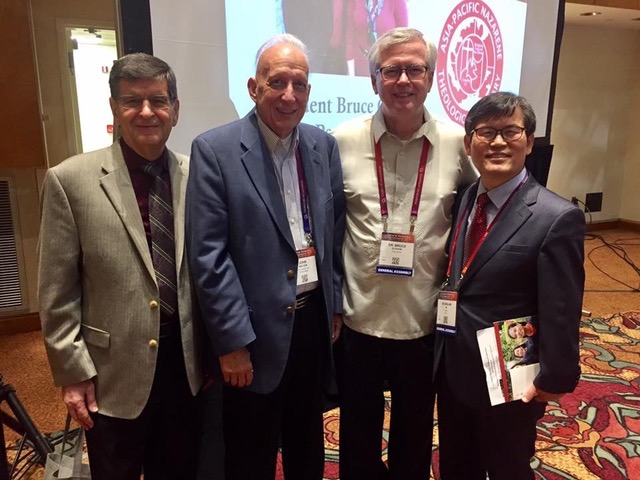Values Underlying
Church of the Nazarene
College, University and Seminary
Faith Communities
Affirmation #3
As I mentioned in the previous blog posts, I have been asking myself throughout the past few years some fundamental questions about our Nazarene colleges and universities: (1) What drives or motivates our colleges and universities as Christian institutions of higher education? (2) What characterizes us at our best and convicts us at our worst? (3) What shapes the lifestyle – the words, action, and behavior – of our campuses as faith communities? (4) What is foundational to our conviction that God calls all believers to a life of holiness? (5) What are the values for which we stand?
I began to answer these questions in the previous blog.
Affirmation #1 – WE LOVE GOD. Therefore, we value and stand for:
- A Worshiping Community
- A Biblical Faith
- A Christlike Lifestyle
- A Holiness Ethic
- A Global Mission
- A Creation Vision
- A Spirit-Empowered Devotion
Affirmation #2 – WE RESPECT OTHERS. Therefore, we value and stand for:
- A Magnanimous Spirit
- A servant Mentality
- A Trustworthy Character
- A Positive Influence
- A Courteous Response
- A Giving Motivation
- An Appreciative Attitude
Affirmation #3, WE ARE RESPONSIBLE FOR OURSELVES. Therefore, we value and stand for…
1. An Inquisitive Mind
“Truth will ultimately prevail” is often quoted. And this is true if committed Christians believe that God is the Source of all truth. If this be so, seekers after truth have no fear in pursuing questions about God, humankind, life, death, or eternity.
“The mind is a terrible thing to waste” is another oft-quoted statement. And, again, it is true. To always let other people think for you is a terrible indictment of anyone.
Students on Nazarene campuses are encouraged to read good books, journals, magazines. Obsessively read them. Invest in them. At the same time, with John Wesley, determine to be a “man (or woman) of one book – the Bible.”
“…whatever is true, whatever is noble, whatever is right, whatever is pure, whatever is lovely, whatever is admirable – if anything is excellent or praiseworthy – think about such things.” (Philippians 4:8 NIV) — What a life verse!
Nazarene colleges, universities and seminaries are at their best faith communities of learners.
2. A Disciplined Schedule
“Begin with the end in mind” is habit #2 in Steven Covey’s book Seven Habits of Highly Successful People. This statement can refer to a lifetime, a project, or a daily schedule. Members of a campus community tend to accomplish more if we begin the day (or project or life) with a sense of perspective of what the end result should be and a plan of action to guide them step by step in the process.
Elaborate “time planners” and good calendars are available are available to assist faculty, staff and students to organize the day, week, or month. Campus life challenges everyone to be creative and create a time management system that works for each individual.
Some students benefit from the consultant many years ago who earned $25,000 after advising the CEO of a major company to organize his days in the following manner:
1. Each evening identify the six most important things to be accomplished the next day.
2. Number the six in order of priority.
3. The next morning begin the day by starting with the first priority and staying with it until it is finished.
4. Then go to the next priority.
5. Continue this process throughout the day.
6. At the end of the day, repeat #1.
Life on Nazarene colleges and universities require everyone on campus to manage multiple priorities simultaneously. Students need to so schedule study time that they devote some time to each of their courses every day. The challenge to balance “precious” free time is real. Campus life demands that students choose wisely between the numerous good programs: athletics, clubs, social activities, and projects available to you on campus. Students enrolled in on-line, non-traditional or decentralized programs must balance their time between family, work and school responsibilities.
Plan your work. Work your plan. Sounds simplistic for a Nazarene campus community. But it works.
3. A Modest Attire
Modesty has long been affirmed as a standard within the holiness churches. In fact, modesty, neatness, and cleanliness form a three-legged stool on which rests much of the Student Life Handbooks and lifestyle guidelines for Nazarene colleges and universities. But defining modesty is difficult. It seems as if everyone has his or her own opinion regarding the nature of modesty. There are extreme examples of clothes and appearance, and advocates of both extremes strongly – and sometimes loudly – proclaim “their” view is the right view.
Most Christians affirm the principle of modesty; yet few agree on the details. This makes it particularly difficult for Christian institutions, which affirm the principle of modesty, to find a standard acceptable to all. In fact, it can’t be done to the satisfaction of everyone – believe me!
Whatever modesty is or is not, the Spirit-filled Christian (or institution) seeks to look and live in a way that is qualitatively different than individuals (and institutions) who do not profess faith in Jesus Christ as Lord. Our appearance, including the clothes we wear, should be…
• appealing, but not seductive,
• attractive, but not revealing,
• appropriate, but not offensive or extreme.
The big question for the Christian, male or female, growing in Christlikeness, is not, “How far can I go and get away with it?” but, “How can I dress in such a way as to bring honor and glory to God and strengthen my friends in the faith who may not be as strong spiritually as I?”
4. A Balanced Diet
“Do you not know that your body is a temple of the Holy Spirit, who is in you, whom you have received from God?…Therefore honor God with your body” (I Corinthians 6:19-20).
Nazarene college and university leaders talk often about the need for a balanced diet.
What we eat – or don’t eat – can build us up or break us down. When we eat a balanced diet, we feel better, look better, sleep better – we are better physically!
Students are encouraged to learn about fat grams, carbohydrates, calories, vitamins, food supplements, and nutrition.
The key word is balanced. Since each individual is different, what balanced means to you will differ from that of your roommate, friend, or spouse. Parents, knowledgeable friends, physicians, school nurses and books on health and nutrition assist the campus community in providing information on a balanced diet.
And one final word. Don’t skip meals. Remember, the key word is balanced.
5. A Physical Fitness Commitment
We’ve heard the admonition from so many experts that we ought to believe it. Exercise for at least thirty minutes three times a week. Nazarene campus leaders encourage students to get involved in a physical fitness program. The issue isn’t how good or bad they are at athletics — the issue is exercise…and fun. Students should find an intramural basketball, volleyball, soccer, or softball team with which they can exercise on a regular basis.
Nazarene campus communities are encouraged to walk or jog around campus regularly or to bike for so many miles each week.
Faculty members set good examples of a commitment to physical fitness by regularly playing basketball or soccer. Others jog early each weekday morning.
Students are encouraged to get a good night’s rest each evening. There is a strong correlation between a good night’s rest and physical fitness. The entire resident community needs to respect the common quiet hours in the dorms designated for study and respect the “quiet” guidelines for others’ sake as well as your own. Same goes for students studying in homes.
Whatever is right for students and faculty, campus communities are committed to make a plan – a systematic schedule – of physical fitness. Your long life and health may depend on it!
6. A Reliable Word
It is important that members of our campus communities, be known as persons who keep her/his word. God’s answer to the prophet’s complaint in Jeremiah 12:6 is, “Do not trust them, though they speak well of you.” No more pathetic words can be spoken of a person than these – you can’t trust her/him. What an indictment!
Conversely, one of the greatest compliments a person can give to another is this: You can trust her/him. Our word, our integrity, our credibility are ultimately so much more important and long lasting than popularity, fame, or fortune. These can and do pass. But our word remains.
Therefore, by God’s Spirit, Nazarene faculty and students are challenged to be honest, trustworthy, truthful and to speak with others in such a way that when they hear you, they trust you. Adhere to Jesus’ words when He said, “Let your yes be yes, and your no, no.” Don’t say one thing and mean another. Don’t deceive or mislead others. Shoot “straight” with them. Your personal integrity and credibility is intrinsically linked to a reliable word. Protect your integrity and credibility with a passion. Our schools seek to preach, teach and model this value before others within the faith community.
7. A Lifelong Learning and Growth Perspective
Years spent at a Nazarene college, university or seminary should instill within the student a desire for a lifelong pursuit for personal and professional growth. It is folly to believe that in such a brief span of time all that needs to be known will be grasped. Just the opposite should occur. The more you know about a subject, the more you find there is to know. This relates to your vocational choice, and to your walk with God.
Let us hope that the Nazarene educational experience will ignite a spirit of inquiry that will last a lifetime. Students should at least know the right questions to ask. You should be pointed in the right direction. Students, administrators and faculty should be forever committed to a quest for truth and righteousness. Increasingly, we desire the integration of faith and learning.
Paul could say while in prison near the end of his lifetime, “Not that I have already obtained… but I press on…. Forgetting what is behind and straining toward what is ahead, I press on…” (Phil. 3:12-14).
And this is the perspective on Nazarene campuses, regardless of where we are in the journey of life, we will never be content with where we are in our growth we will “press on.” After completion of your academic program, continue your personal development through seminars, workshops, graduate programs, short-term institutes, attending cultural events, and reading. Cultivate your insatiable desire to learn and grow.
Conclusion
Do we always live by the values we affirm? Unfortunately, not always. But for the Spirit-filled Christian, increasingly these values flowing from the foundational principles of the biblical mandate to live a holy life will “mark” or characterize and challenge us.
Holiness is a way of life – a lifestyle. In reality, this means that throughout our relationship with Christ, we will continue to grow and mature in the Christian faith and in our walk with the Lord.
A gospel song has as its theme, “It was all because of God’s amazing grace.” And it’s true. God’s grace extended to us — though undeserved — empowers and enables us through faith in Jesus to live the holy life to which we have been called. It’s not by our efforts. The scriptures remind us that “My grace is sufficient for you, for my power is made perfect in weakness” (2 Corinthians 12:9).
May each student’s experiences at a Nazarene college, university or seminary strengthen the values that she or he has begun to affirm. The greatest compliment a Nazarene institution can receive from a graduate is that he or she is much stronger and more developed in mind, body, and spirit than when he or she enrolled at the school.





